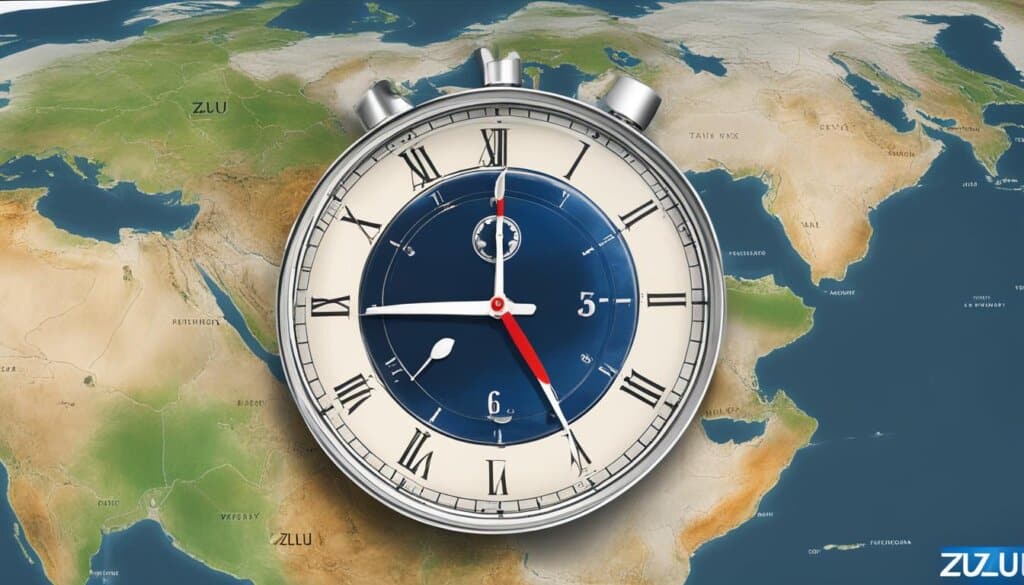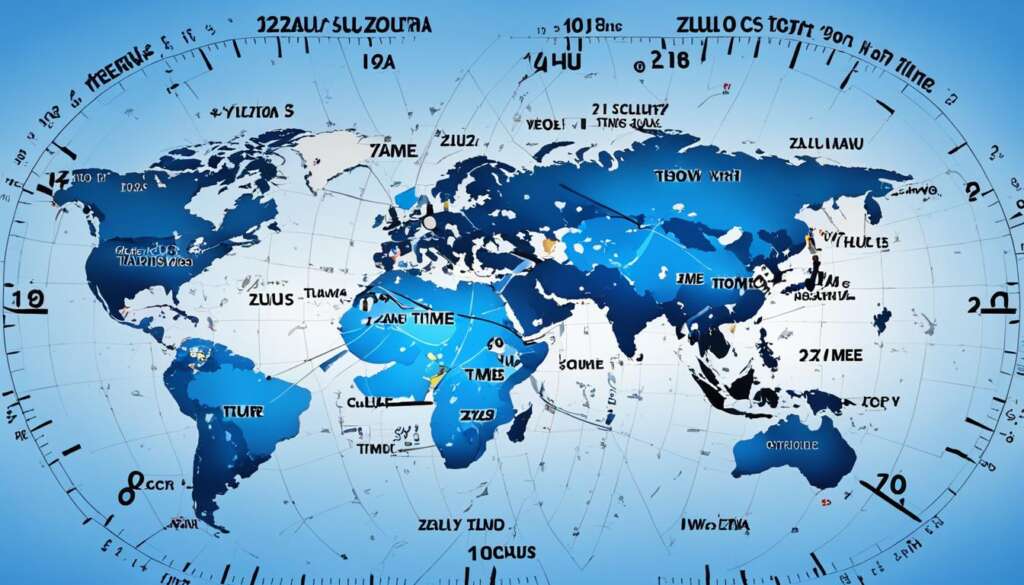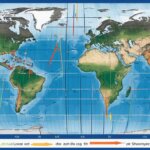Table of Contents
Zulu time, also known as Universal Coordinated Time (UCT), is a timekeeping system used in the military and aviation industries to synchronize activities across different time zones. It serves as a global reference point for coordinating operations, ensuring universal synchronization. The U.S. military and aviation industry rely on Zulu time extensively in their operations.
With Zulu time, various time standards and offsets are eliminated, reducing confusion and facilitating smooth international coordination. It is based on the Greenwich Meridian in London, England, and is measured in hours, minutes, and seconds. By using Zulu time as a common time standard, organizations across the globe can effectively communicate and coordinate their activities.
In this article, we will explore what Zulu time is, how it is measured, and the benefits of using this global time standard. We will also examine its practical applications in aviation and its relation to other time standards. Join us as we delve into the world of Zulu time and its significance in our interconnected world.
What is Zulu Time and How is it Measured?
Zulu time, also referred to as Coordinated Universal Time (UTC), serves as a standard reference used globally to avoid confusion caused by local time differences. It is measured in hours, minutes, and seconds using the Gregorian calendar and a 24-hour format. Unlike most time zones that use 12 noon or 12 midnight as the reference, Zulu time starts at midnight. Military shorthand denotes Zulu time by the letter Z following the time expressed in UTC.
If you imagine the Earth as a sphere, the Prime Meridian is the line that divides it into two halves. Zulu time is based on the time at 0° longitude, which is the Prime Meridian located in Greenwich, England. This location was chosen as the reference point to standardize timekeeping worldwide.
Using Zulu time as a global time standard ensures seamless coordination and synchronization across different time zones, avoiding confusion that can arise when using local time or time zones. By establishing a single point of reference, Zulu time simplifies communication and enables efficient scheduling and coordination of activities across the globe.
“Zulu time is a crucial component in the military and aviation industries, enabling accurate coordination and communication between different parties involved in operations across borders”
Measurement of Zulu Time
The measurement of Zulu time is derived from the Gregorian calendar, which is the internationally accepted standard calendar. It follows a 24-hour format, where each day is divided into 24 equal hours. Each hour consists of 60 minutes, and each minute is composed of 60 seconds.
To convert local time to Zulu time, one must consider the time zone offset. By adding or subtracting the time zone offset from the local time, the corresponding Zulu time can be determined. For example, if it is 10:00 AM in London (UTC+0:00), the equivalent Zulu time would be 10:00 Z.
| Zulu Time | Local Time | Time Zone Offset |
|---|---|---|
| 14:00 Z | 10:00 AM | +04:00 |
| 23:30 Z | 6:30 PM | -01:30 |
| 07:45 Z | 7:45 AM | ±00:00 |
The table above demonstrates how Zulu time is determined by applying the appropriate time zone offset to the local time. This conversion method ensures accurate synchronization across different regions and simplifies global coordination.
Why Use Zulu Time?
Zulu time plays a vital role in military and aviation operations, offering numerous benefits for global coordination and synchronization. By using Zulu time as a universally applied standard, various activities can be seamlessly coordinated across different time zones. This eliminates the confusion and challenges that arise when dealing with countries using different time standards.
The importance of Zulu time lies in its ability to simplify communication and ensure accurate scheduling of time-related matters. It serves as a reference point that facilitates smooth and efficient global coordination, particularly in critical industries such as aviation. By adopting Zulu time, organizations can eliminate misunderstandings and streamline operations.
Here are some key benefits of using Zulu time:
- Universal Standard: Zulu time provides a single standard time that is universally understood and applied across the globe. This eliminates the need for complex conversions and ensures clear communication between different parties.
- Elimination of Confusion: With Zulu time, there is no confusion caused by varying time standards and offsets. Coordinating activities becomes straightforward, enabling efficient planning and execution.
- Global Coordination: Zulu time allows different time zones to be synchronized, ensuring smooth global coordination. Whether it’s coordinating military operations or managing international flights, Zulu time provides a common reference point for precise timing.
- Efficiency and Safety: By using Zulu time, organizations can enhance efficiency and safety in their operations. Standardized timekeeping simplifies scheduling, reduces errors, and minimizes the risk of accidents or incidents due to miscommunication.
Zulu time is a valuable tool for industries that require precise coordination across time zones. Its global importance and benefits make it an essential component of modern-day operations.

Zulu Time vs. Time Zones
Zulu time serves as a global time standard, but it is distinct from time zones, which are measured as the number of hours offset from Greenwich Mean Time (GMT). Zulu time, also known as Coordinated Universal Time (UTC), is expressed as UTC+0000, indicating it is zero hours ahead of GMT. On the other hand, time zones have varying offsets from GMT.
Let’s take a look at some examples:
| Time Zone | Offset from GMT |
|---|---|
| Eastern Standard Time (EST) | UTC-0500 |
| Central Standard Time (CST) | UTC-0600 |
| Mountain Standard Time (MST) | UTC-0700 |
| Pacific Standard Time (PST) | UTC-0800 |
It’s important to note that some regions observe daylight saving time, resulting in changes to the time zone offsets during certain periods. Therefore, the comparison between Zulu time and time zones requires recognition of these adjustments.
Zulu time, being a standard reference point, allows for universal coordination across time zones. It eliminates confusion that may arise from different time standards and offsets, ensuring smooth operations in various industries, particularly in aviation and military sectors.
How to Convert to Zulu Time
Converting to Zulu time is a straightforward process that requires two key pieces of information: the local time and the local time zone offset. To determine the local time, you can refer to a watch or clock set to the local time. The local time zone offset, on the other hand, can be obtained from reliable sources such as the Federal Aviation Administration’s website, which provides comprehensive details on time zones.
To calculate Zulu time, you need to add or subtract the local time zone offset from the local time, depending on whether you are ahead or behind Coordinated Universal Time (UTC).
“Calculating Zulu time involves adding or subtracting the local time zone offset to the local time.”
Let’s consider an example to illustrate the conversion process. Imagine you are in a location where the local time zone offset is UTC+0500. If your local time is 12:00 PM, subtracting the local time zone offset of 5 hours will give you a corresponding Zulu time of 07:00 AM. On the other hand, if your local time is 02:00 AM, adding the local time zone offset will yield a Zulu time of 07:00 AM as well.
By accurately calculating and converting to Zulu time, you can align your activities with a global time standard, facilitating efficient coordination and synchronization across different time zones.
| Local Time | Local Time Zone Offset | Zulu Time |
|---|---|---|
| 12:00 PM | UTC+0500 | 07:00 AM |
| 02:00 AM | UTC+0500 | 07:00 AM |
Practical Uses of Zulu Time in Aviation
Zulu time, also known as Coordinated Universal Time (UTC), plays a critical role in aviation operations. Its applications are widespread and integral to ensuring safe and efficient air travel.
One of the primary uses of Zulu time in aviation is for navigation purposes. When aircraft cross multiple time zones, it is essential for pilots to accurately communicate their positions using a consistent time standard. Zulu time, being universally recognized and understood, provides this standard.
Zulu time allows pilots to state their positions unambiguously, reducing the risk of confusion and enhancing air traffic control coordination. It ensures that all parties involved in aviation operations are operating on the same temporal reference.
Weather Reporting
Accurate and standardized weather reporting is crucial for flight safety. Zulu time is used to communicate weather conditions to pilots effectively. By utilizing a common time reference, weather reports can be transmitted across different regions without any ambiguity.
Pilots rely on Zulu time in weather reports to make informed decisions regarding flight routes, potential turbulence, and adverse weather conditions. This standardized communication enhances pilot situational awareness and contributes to safer flying.
Flight Planning and Scheduling
Zulu time simplifies flight planning, arrival and departure scheduling, and incident reporting in the aviation industry. It serves as a common reference point for coordinating flight operations globally.
Flight plans, schedules, and incident reports are communicated using Zulu time to ensure clear and consistent communication between pilots, air traffic control, and other stakeholders involved in aviation operations. This enables efficient coordination and helps avoid conflicts or errors arising from time-related misunderstandings.
Comparison of Zulu Time Applications in Aviation
| Application | Description |
|---|---|
| Navigation | Allows pilots to accurately communicate positions and enhance air traffic control coordination. |
| Weather Reporting | Ensures accurate and standardized communication of weather conditions, enhancing pilot situational awareness. |
| Flight Planning and Scheduling | Simplifies coordination of flight operations globally, minimizing conflicts and errors. |
In summary, Zulu time’s applications in aviation are diverse and crucial for safe and efficient air travel. Whether it’s navigation, weather reporting, or flight planning, Zulu time provides a universal time standard that facilitates clear and consistent communication between all parties involved in aviation operations.
How Zulu Time Relates to Other Time Standards
Zulu time, also known as Coordinated Universal Time (UTC), is closely associated with Greenwich Mean Time (GMT). While their names may differ, both UTC and GMT represent the same time standard and serve as global references for time synchronization.
Coordinated Universal Time (UTC) is the more commonly used term worldwide, often used interchangeably with Zulu time. It refers to the time at the Greenwich Meridian, which is the prime meridian used as a reference point for measuring time.
Greenwich Mean Time (GMT) is still widely recognized, particularly in the context of timekeeping related to the Royal Observatory in Greenwich, England. It shares the same reference point as Zulu time, making it synonymous with UTC.
Key Takeaways:
- Zulu time (UTC) and Greenwich Mean Time (GMT) are two names for the same time standard.
- Both UTC and GMT represent the time at the Greenwich Meridian.
- Coordinated Universal Time (UTC) is the more commonly used term globally.
- Greenwich Mean Time (GMT) is widely recognized, especially in connection with the Royal Observatory in Greenwich, England.
Example Table: Comparison of Zulu Time, UTC, and GMT
| Zulu Time (UTC) | Greenwich Mean Time (GMT) |
|---|---|
| Officially known as Coordinated Universal Time (UTC). | Often used interchangeably with Zulu time. |
| Global reference for time synchronization. | Widely recognized reference point, particularly in relation to the Royal Observatory in Greenwich, England. |
| Used in various industries worldwide. | Historically important for maritime navigation and timekeeping. |
Benefits of Using Zulu Time
The advantages of Zulu time, also known as Universal Coordinated Time (UCT), are far-reaching and essential for global coordination and communication. By providing a universal time standard, Zulu time simplifies the complexities associated with different time zones. Its widespread use in the military, aviation, and shipping industries ensures accurate scheduling and synchronization of activities.
Zulu time eliminates the confusion caused by varying time standards and offsets, allowing for seamless coordination between different locations around the world. It serves as a common reference point, enabling efficient and effective communication in time-related matters. By adhering to Zulu time, organizations can enhance safety and streamline their operations, ultimately improving overall efficiency.
The importance of Zulu time cannot be overstated, especially in critical industries such as aviation, where precise timing is crucial for navigation, flight planning, and communication. Zulu time acts as a global standard that enables seamless collaboration between pilots, air traffic controllers, and other aviation personnel, ensuring safe and reliable operations.
FAQ
What is Zulu time?
Zulu time, also known as Universal Coordinated Time (UCT), is a timekeeping system used in the military and aviation industries to synchronize activities across different time zones.
How is Zulu time measured?
Zulu time is measured in hours, minutes, and seconds using the Gregorian calendar and a 24-hour format. It starts at midnight, unlike most other time zones that use 12 noon or 12 midnight as the standard reference.
Why use Zulu time?
Zulu time provides a single standard time that can be universally applied, eliminating confusion when coordinating activities with countries using different time standards. It ensures smooth and efficient global coordination and simplifies communication in critical industries such as aviation.
How does Zulu time differ from time zones?
Zulu time is distinct from time zones, which are measured as the number of hours offset from Greenwich Mean Time (GMT). Zulu time is expressed as UTC+0000, meaning it is zero hours ahead of GMT. Time zones have different offsets from GMT.
How do I convert to Zulu time?
Converting to Zulu time requires knowing the local time and the local time zone offset. By adding or subtracting the local time zone offset from the local time, Zulu time can be calculated.
How is Zulu time used in aviation?
Zulu time is used for navigation purposes, weather reporting, flight planning, arrival and departure scheduling, and incident reporting in the aviation industry. It serves as a common reference point for clear and consistent communication between different parties involved in aviation operations.
How does Zulu time relate to other time standards?
Zulu time is officially known as Coordinated Universal Time (UTC) and is often used interchangeably with Greenwich Mean Time (GMT). While their names may differ, both UTC and GMT represent the same time standard and serve as global references for time synchronization.
What are the benefits of using Zulu time?
Using Zulu time simplifies global coordination and communication, ensures accurate scheduling and synchronization of activities, and enhances safety in industries such as aviation. It provides a universal time standard that can be easily understood and applied across different time zones.












